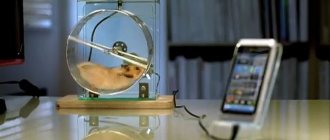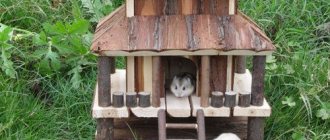Are Labradors suitable for apartment living?
The beauty and grace of the breed is an indisputable fact.
A Labrador in an apartment is the maximum responsibility not only to the dog itself, but also to all household members. Caring for a Labrador in such conditions has its pros and cons.
Labrador for an apartment is a constant source of wool. Raising a dog of such an active breed as a retriever necessarily involves constant, and most importantly, long walks. Keeping this dog in a well-renovated apartment is very thoughtless, since its playful disposition sometimes leads to unconscious damage to property.
But, despite some nuances, there are, of course, advantages:
- The breed is as calm as possible towards other animals that live in the same territory with it.
- The dog will not bark “uselessly.”
- For a child, the dog will become a true friend and even a nanny, since the level of responsibility of this breed is off the charts.
- Dogs growing up in an apartment have more opportunities to communicate with their owner, and this fact has a positive effect on their relationships.
Advantages and disadvantages of the breed
In a broad sense, the breed has a lot of positive, but also some negative qualities. A Labrador dog at home is:
- A peaceful and good-natured creature who will delight the whole family every day, without exception.
- A friend with excellent intelligence, who understands everything perfectly and fulfills all the owner’s wishes.
- Thanks to its sharp mind, a dog can be not only a friend, but also a companion. Dogs of this breed are often used as assistants by people of different professions.
A huge number of positive qualities does not mean that there are no disadvantages. The disadvantages include:
- Excessive love of love and pathological gullibility.
- Hyperactivity and a categorical reluctance to sit in one place.
Possibility of being kept outdoors
Experienced dog breeders and veterinarians unanimously say that keeping a Labrador on the street is absolutely not harmful. The breed is able to adapt even to severe cold or unbearable heat.
For information. Breeders still recommend placing your pet in a house, since without attention and affection the dog will simply waste away.
If there is no other option and it has been decided to organize a home for your pet in the private sector, that is, in the yard, it is very important to take care of the dog constantly and give it maximum attention. It is strictly forbidden to move a dog from home to street or vice versa. These manipulations will cause stress in the dog and may even lead to illness.
Many people are interested in how to care for a Labrador if he lives on the street. First of all, it is important to understand that this dog is not suitable for being kept on a chain. The best option is a spacious enclosure with an insulated booth.
Being kept on chains has a negative impact on the psyche
Training and education
Labradors are incredibly active and highly trainable dogs. During the training process, it is necessary to avoid harsh punishments.
Submitting a dog doesn't always work. The principle of complete submission of the Labrador Retriever to the owner is an outdated method. This theory was formulated based on observations of packs of wild wolves, but they were kept in captivity and, of course, experienced stress. The stress condition forced wolves to show aggression towards each other, but in the wild they do not show aggression to each other - they live together and interact with each other. You need to perceive yourself as the more experienced and mature member of the pack, who is responsible for guiding the new member (Labrador Retriever puppy) and teaching him good behavior, as well as correcting him if necessary. It is important to remember that Labrador Retriever puppies learn a lot on their own. They are very inquisitive, love to explore new territories and, of course, experiment. Puppies tend to repeat actions they enjoy (like playing with a toy). They do not repeat actions that cause them pain (for example, destroying a nest and getting bitten). If your Labrador Retriever puppy misbehaves, ignore him and praise him when he does the right thing. Reward your puppy for following commands and good behavior. Do not neglect these tips. After all, constantly hearing “you can’t” all day long is unbearable. This is a small child who wants to know everything and get his portion of treats as a reward for not eating your favorite rug, going to the toilet outside, bringing you a ball, and so on.
Set rules and monitor their implementation
It is worth enrolling your Labrador Retriever puppy in obedience training classes. These classes will allow you to understand exactly what actions will allow you to control your dog’s behavior. You will be able to spend more time with your puppy, establish contact and socialize around other dogs.
Adviсe
- Training a Labrador Retriever puppy should be done with the help of positive motivation; watch carefully special films about this technique. The Canine Translator film series from National Geographic is suitable.
- If you need to leave your puppy at home alone for 2 hours or more, then ask someone to come to him.
- Be sure to schedule your Labrador Retriever puppy an appointment with the veterinarian as soon as possible. The doctor will carefully examine him and give him vaccinations that will protect him from dangerous diseases.
Features of the breed and character
From the description of the breed, the main characteristics can be identified. A retriever is a reliable friend and patient companion. He cannot stand loneliness and a long absence of the owner can lead to the pet’s apathetic state. Labrador loves active pastime and long walks.
Important! Some do not take this breed seriously due to the fact that its representatives are very hyperactive and overly kind. A dog will be a good friend and a faithful comrade, but it is unlikely to be a security guard.
Another individual feature of this breed is its long-term “mental maturation”. For three whole years, an outwardly adult dog will behave like a small puppy. That is why it is very important to begin training him from the first minute a new family member is in the house.
The good-natured dog is always ready to play
What to look for when buying a Labrador
When purchasing a Labrador puppy, you need to find out everything about the breed, care and education in advance. First of all, you need to decide for what purpose you are getting a dog. There are three generally accepted classes, which are based on the following characteristics:
- Pet class are dogs that will not participate in exhibitions because they have some deviations from the breed standard. But that won't stop them from being great friends. Another feature of this category is that the dogs are not suitable for breeding.
- The breeding class includes puppies with excellent documents, but with minor external defects. They are not suitable for exhibition, but with the right approach they can produce excellent offspring.
- The most expensive and popular category is show class. These babies contain all the most ideal characteristics. They have an excellent pedigree, eminent parents, and they meet all breed standards.
On a note! The price tag for representatives of different classes can vary from 15,000 rubles to 60,000 rubles.
Water treatments are a joy for dogs
Grooming
Grooming a Labrador and inventing hairstyles are not necessary procedures, since the hair of the breed is short. It is enough to comb the dog 2-3 times a week with a special brush and subject the dog to water procedures once every 3 months. Washing a puppy is difficult, but gradually it needs to be accustomed to detergents.
Labradors love baths, but babies may be scared of the foam. Wash your dog under warm running water using a special shampoo for dogs. Do not use soap or human hygiene products, as they can wash away all the fat underneath the fur and dry out the skin.
How to prepare a home and place for a puppy
You should prepare in advance for the arrival of a new family member. It is important to learn how to care for your Labrador puppy before he arrives. Small representatives of this breed are very active. Fragile or dangerous items will need to be removed. During play, a pet can not only break something, but also accidentally harm itself. The period of maximum activity in a Labrador lasts approximately two years, and only constant monitoring of the dog and educational work will keep the house intact.
The puppy must have its own personal space. For sleep and relaxation, it is best to use a soft lounger with a removable cover, which will have to be washed from time to time.
For information. Labrador is one of the few breeds that simply love to sleep on a pillow.
You will also need to properly equip the place for eating. It is very important to have two bowls, one of which will be used for food, the other for water. Even at the initial stage, you will need some pet care products:
- Comb.
- Massage brush.
- Personal towel.
- Cosmetics for dogs.
- Claw cutter.
- Collar.
- Leash.
- Special toys.
The list can be replenished or modified depending on the preferences of not only the owner, but also the dog.
You need to prepare in advance for the puppy's arrival
Labrador nutrition
Puppies are given to new owners when they are already able to feed themselves. At first, babies are fed 5-6 times a day. With age, the number of feedings decreases, and the volume of each serving increases. By the age of 2, the dog switches to two meals a day, and in the summer, one feeding a day is enough.
If the breeder did not consider it necessary to tell you how and what to properly feed a Labrador puppy at 2 months when you purchased it, ask your veterinarian. You can purchase either special ready-made food for large breed puppies, or feed them homemade food: cottage cheese, kefir, beef, vegetables and cereals.
Labradors are prone to gaining excess weight, and they almost always have an excellent and insatiable appetite. But an overly fat dog will invariably develop health problems, so you will have to make sure your pet doesn't eat too much throughout his life.
There should be no pieces or additional feedings between normal feedings. It is unacceptable to feed your dog from the table while you are having lunch yourself. Never do this yourself or let your family do it. Firstly, this is unnecessary pampering, spoiling the character of the pet, turning it into an eternal sad beggar. Secondly, human food is harmful to dogs, as it contains an unacceptably high amount of salt, sugar and seasonings. Do not give your Labrador sweets - they are harmful to dogs. It is better to replace sweets with simple crackers, crackers or special dog cookies.
How and what to feed your Labrador? Breeders usually give their recommendations on how to properly feed a Labrador. Some people prefer to feed with natural products, others like the BARF feeding system, and many prefer ready-made dry food. Disputes between adherents of one system or another do not subside and will never subside, since there is no unambiguous and firm answer and cannot be. When choosing which food to choose for your Labrador, focus on your pet and your capabilities. Feeding a Labrador usually does not complicate the life of the owners with whims and problems, since the dogs have a good appetite and eat everything.
It is most practical to feed your dog dry food. This is also convenient because they are balanced in the content of vitamins and microelements, and you do not have to give additional vitamins. However, it is recommended to use only good food of at least Premium class, which is quite expensive. But even the most expensive food can cause an allergy.
Homemade food usually includes:
Food must be cooked separately, with virtually no salt and no seasonings. It is not always possible to accurately balance homemade food, so you will have to give your puppy additional mineral and vitamin supplements from time to time.
How to properly care for a Labrador puppy
Care and maintenance for a Labrador Retriever means more than just feeding and walking. The dog needs to be vaccinated and regularly seen by the veterinarian.
The pet needs to be taught hygiene procedures at a very young age. Examination of ears, eyes and teeth should be carried out at least 3-4 times a month. Every day, after walks, you should carefully examine your dog for ticks. Due to the dog's natural cleanliness, there is no need to bathe the dog often. It is best to brush once a week with a stiff brush.
Advice! If there is a body of water nearby, the dog will swim in it with great pleasure, since Labradors are excellent swimmers.
Raising puppies
Raising a Labrador puppy is not difficult. The main thing is not to humiliate or punish the child; the basics of education are taught in a good atmosphere of mutual understanding.
Labrador retriever puppies are similar in character to typical Labradors, so the upbringing is the same.
The main aspects that require application when raising Labrador puppies:
- Cleanliness.
- Good behavior in street conditions.
- Exemplary behavior in an apartment or house.
From a young age, the baby is taught to go to the toilet on the streets, of course, if the Labrador puppies have already been vaccinated. In an apartment, it is possible to train a puppy to “do things” in special diapers or in a tray. But from the age of 6 months, the puppy should already ask to go outside to the toilet. You cannot physically punish a child while raising him. Love and understanding mean a lot to a dog.
How to raise a Labrador puppy? When bringing a small puppy into the house, be prepared that all untidy shoes, wires, cell phones will remain bitten by small teeth. Labrador puppies and other babies display similar “dignity”. To avoid trouble, try to remove the necessary objects from the puppy’s field of view. With age, the puppy will cease to show interest in outrages.
Do not teach a puppy to eat from the table; it is difficult to wean an adult dog from this. The puppy is given a strictly designated place for feeding, and the dog eats on time. Pet snacks are not allowed! The baby is given his own sleeping place; it is impossible for the puppy to fall asleep and wake up in a bed or on a soft chair.
Training a puppy
Training a Labrador puppy is about being able to fulfill the slightest demands and commands of the owner. Labradors are understanding creatures; there are no difficulties in following commands.
The only difficulty is that the sociable “bear cub” is constantly trying to communicate with someone, which is not recommended for his safety.
Puppy food
How to feed a Labrador puppy?
The feeding scheme for puppies is the same: up to 3 months of age they are supposed to feed 6 times a day, up to 5 months - 5 times, up to 7 months - 4 times, after 9-10 months they switch to 3 feedings a day , after a year the dog is fed 2 times. Meal times are the same. An unpleasant point in the Labrador’s character is that the dog is a true glutton. If you feed your baby excessively (which the dog is extremely happy about), the dog will become obese, and along with obesity will come many diseases. The Labrador puppy's nutrition is balanced, complete and of high quality.
The preferred food for Labrador puppies is dry. You can mix the granules with cereal porridges or soups. The Labrador's diet includes the following foods: skinless and boneless chicken, beef or veal, low-fat fish, eggs, sunflower oil, rice, oatmeal, buckwheat, dairy products, cottage cheese, vegetables and fruits. The Labrador is very active; from puppyhood it is recommended to add vitamin and mineral supplements to the food.
Caring for a Labrador in a private home
Food and care for a Labrador living in a private house are practically no different from living conditions in an apartment. A huge advantage will be the constant opportunity for active pastime. If you fence the enclosure and use it not only for relaxation, but also for your pet to play, he will be happy.
Living dogs of this breed outside in the winter, even in a warm kennel, causes a lot of controversy between breeders. Severe frosts can lead to chronic diseases such as colds and joint diseases. Another difference in caring for a retriever in a private home is the need for bathing procedures from time to time.
In winter, the dog may need insulation
Health and vaccinations
By the age of 45 days, Labrador puppies are given deworming medications twice. If the breeder has not done this, it is necessary to give the pet anti-worm medication on the fifth day of being in the new home and ten days before vaccination.
Then the vaccination procedure begins:
- At two months, the first vaccine is administered; as a rule, a complex vaccine is used, which is administered twice with a break of two weeks.
- Rabies vaccination is scheduled at three months.
- After the course of vaccinations, the dog is quarantined for two weeks.
The following diseases are common among Labradors:
- food allergies;
- dysplasia of the hip and elbow joints;
- paraproctitis;
- osteochondrosis;
- eye diseases.
It is believed that the Labrador is a strong, disease-resistant dog, but it is possible to keep your pet active and vigorous only with proper disease prevention and regular visits to the veterinarian.
At the slightest sign of illness, you cannot start treatment on your own; only a specialist can prescribe a treatment regimen based on examinations and test results.
Features of living in an apartment
To keep a dog in an apartment, the owner must have a lot of free time and, most importantly, the desire to spend it with his pet. As mentioned above, Labradors are a very active breed that can even become fat if not exercised. You can save your dog if:
- run with your pet every day;
- constantly visit specialized areas created for the most active pastime and communication of dogs;
- Conduct joint training daily.
Essentially, the breed is suitable for athletes or people leading an active lifestyle.
A sedentary lifestyle can lead to obesity
Education and training
The process of education, as well as training for a Labrador, is a necessity. Only in this case will it be possible to raise a socially adapted dog who will react soberly to the world around him. For a Labrador, it is not even necessary to invite a professional, you can only use his recommendations and carry out all the training yourself. This is due to the fact that the breed has natural intelligence and grasps everything literally on the fly. The main thing is to cope with the pet’s restlessness and “frantic” activity.
Advice! From a very young age, a puppy must be protected from strangers. His excessive goodwill can play a cruel joke on him.
During the training process, it is necessary to gradually accustom the puppy to children. A Labrador will never intentionally harm a child, but due to its mobility it can simply demolish the baby.
A reverent attitude towards children is in the blood of this breed.











